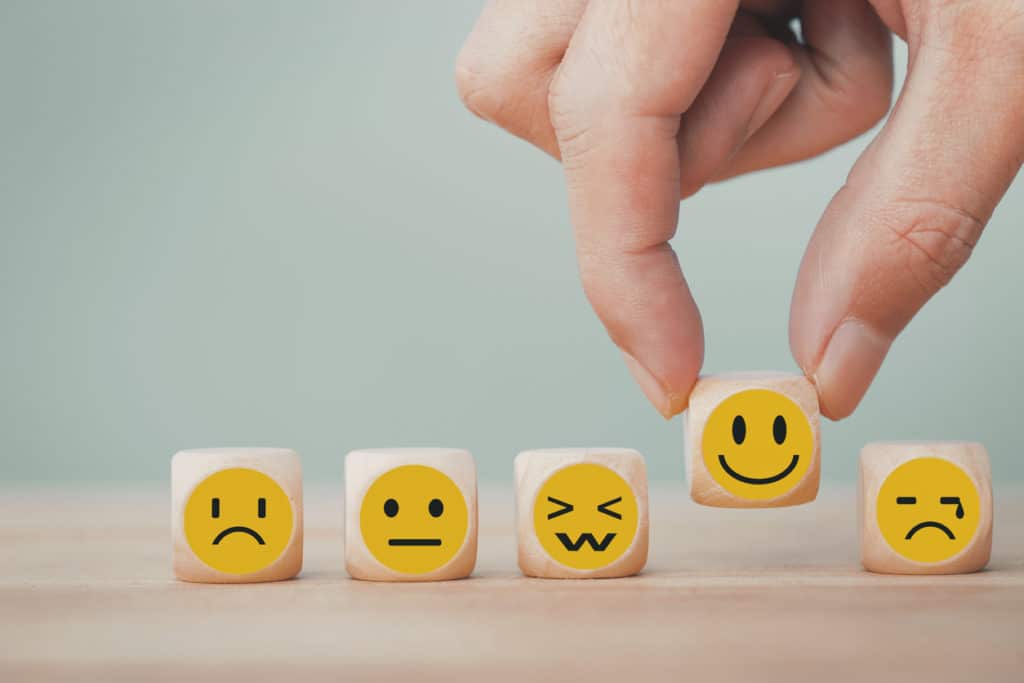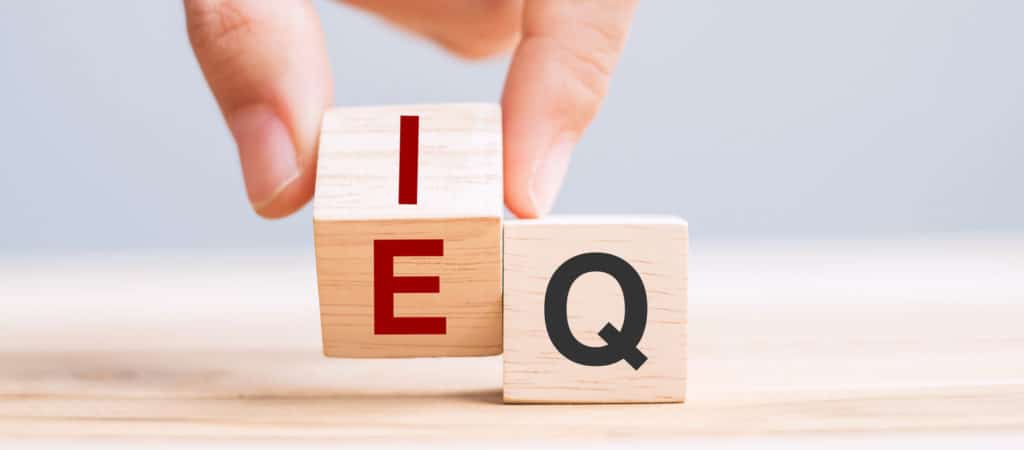Research suggests that emotions play a crucial role in shaping our experiences and behavior in daily life and they play a BIG role in how we show up in relationships. Emotions are psychological states that involve subjective feelings, physiological changes, and behavioral responses. They can be triggered by various internal and external factors, including events, people, and circumstances. At PIVOT, we don’t view emotions as good or bad.
Emotions Are Important In Daily Life For Several Reasons
First, they help us interpret and respond to our environment. Basic emotions provide us with valuable information about the world around us, enabling us to identify and respond appropriately to different situations. For example, feeling fear in response to a perceived threat can prompt us to take action to protect ourselves, while feeling joy in response to positive news can motivate us to pursue further opportunities for happiness and connection.
Second, basic emotions are a fundamental aspect of human communication. They allow us to express ourselves and convey our thoughts, feelings, and intentions to others. For instance, we can use facial expressions, vocal intonation, and body language to communicate our emotions to others, helping to build social connections and build relationships.
Third, emotions are closely tied to motivation and goal-directed behavior. The desire to experience certain emotions, such as happiness or love, can motivate us to pursue particular activities or goals.
Conversely, the avoidance of what some perceive as negative emotion, such as anger, can also drive our behavioral responses and decision-making.
The truth is anger, fear, guilt, etc., are not necessarily negative emotions.
For example, anger can prompt us to have crucial conversations. At PIVOT, we call these invitations to communicate effectively so people don’t just make quick decisions that can affect them long term.
As stated above, fear can prompt us to take action to protect ourselves and those we love.
Guilt can prompt us to lean into forgiveness and let go of what otherwise could lead to self-destructive behavior.

What’s the Difference Between Emotions and Feelings?
Emotions and feelings are often used interchangeably, but there is a subtle difference between the two.
Emotions refer to a complex psychological and physiological response to an external stimulus, such as an event, a person, or a situation. Emotions are typically short-lived and automatic, and they often involve physical sensations, such as increased heart rate, sweating, and changes in facial expression.
For some, emotions can hijack your nervous system and take you full force into an emotional storm that can wreak havoc in relationships if not managed and tolerated in the given moments.
Feelings, on the other hand, are more subjective and often longer-lasting than emotions. They refer to the conscious experience of emotional states and can be influenced by personal beliefs, thoughts, and memories. Understanding feelings is essential for self-awareness and emotional intelligence.
Unlike emotions, feelings are not always linked to a specific event or stimulus, and they can be triggered by internal as well as external factors.
What are Examples of Some Emotions and Their Definitions?
- Happiness – Any state of being, having considerable permanence, in which pleasure decidedly predominates over pain
- Sadness – Experiencing loss/sorrow
- Anger – A strong feeling of displeasure and belligerence brought on by something bad
- Fear – Impending danger
- Disgust – To cause extreme dislike
- Surprise – Sudden feeling of astonishment
- Love – Affection for another person
- Joy – Great delight
- Excitement – To arouse or stir up
- Guilt – A sense of wrongdoing
Types of Emotional Responses And Related Behavior
The experience of responses that are emotional is a human characteristic that occurs in reaction to specific events or situations. Major emotions, which include primary emotions, play a significant role in these emotional experiences. The emotional experience that people have in being on the receiving end of these specific events or situations can cause reactions that create connection and also create confusions and conflict.
For instance, people may experience great joy, a major emotion, when receiving positive news, or feel fear, another major emotion, when faced with a threat. The influence of major emotions is significant in shaping daily life, including decision-making processes that are influenced by one’s level of joy or anger.
Often, the motivation behind a particular activity is the emotion it elicits, especially when it comes to major emotions.
Therefore, comprehending emotions, particularly major emotions, is vital for navigating life in a more composed manner. These can be broadly categorized into three categories: primary, secondary, and mixed emotions.
Primary or Basic Emotions
Primary emotions are considered the fundamental or basic emotions that all human beings experience. These emotions include happiness, sadness, fear, anger, surprise, and disgust. Primary emotions are considered universal, meaning they are expressed and recognized across cultures and languages.
They are closely related to behavior, as they can influence the way individuals act and react in various situations. These basic emotions are typically automatic and immediate, and they can trigger physiological and behavioral responses that help individuals respond to different situations.
Here are some examples basic emotions:
- Fear can trigger a “fight or flight” response, causing individuals to either confront the source of the fear or flee from it.
- Anger can motivate individuals to take action in response to a perceived injustice or threat.
- Happiness can encourage individuals to engage in activities that promote well-being and pleasure.
Primary emotions can also influence social behavior, as they are often communicated through facial expressions, vocal intonation, and body language.
For instance, a smile is a universal expression of happiness, while a furrowed brow is a common expression of anger or concern. Facial expressions are often misunderstood. Like a furrowed brow might just be a feeling of confusion for some. However, there are common expressions, vocal intonations, and body language that are indeed universal.
Moreover, primary emotions can influence decision-making and problem-solving by shaping an individual’s priorities and preferences.
For instance, a person experiencing intense feelings of fear may prioritize finding safety over other concerns, while a person experiencing joy may prioritize pursuing activities that bring them pleasure.
Secondary or Complex Emotions
Secondary emotions, also known as complex emotions, are a blend of primary emotions. Examples of secondary emotions include guilt, shame, envy, and jealousy. These emotions involve a more complex cognitive appraisal of a situation, such as evaluating the fairness of a situation or judging the actions of oneself or others.
Unlike primary emotions that are often automatic and instinctive, secondary emotions require a more complex cognitive appraisal of a situation and involve a deeper level of introspection.
Complex emotions can play a significant role in behavior by influencing decision-making, problem-solving, and social interactions.
For example, guilt and shame are secondary emotions that are associated with a sense of responsibility or accountability for one’s actions. These emotions can motivate individuals to make amends, apologize, or take corrective action to rectify a situation.
Similarly, envy and jealousy are secondary emotions that are often associated with social comparison and competition. These emotions can motivate individuals to strive for success or work harder to achieve a particular goal.
However, complex emotions can also have negative effects on behavior.
For instance, excessive guilt or shame can lead to self-blame, low self-esteem, and at times, severe self-destructive behavior. Jealousy or envy can lead to resentment and interpersonal conflicts.
Mixed Emotions
Mixed emotions refer to the experience of two or more primary or secondary emotions simultaneously. For example, a person may feel happy and sad at the same time, such as when attending a bittersweet event like a graduation or a funeral. Mixed emotions can also occur when there is conflict between primary or secondary emotions, such as feeling both anger and guilt after having an argument with a loved one.
Mixed emotions can influence behavior in a number of ways.
For example, mixed emotions can lead to indecision or uncertainty, as individuals may struggle to prioritize or balance conflicting emotions. They can also lead to a sense of emotional turmoil or inner conflict, which can be distressing or unsettling.
Mixed emotions can also influence social behavior by shaping communication and interpersonal relationships.
For example, when individuals experience mixed emotions during a conversation, they may have difficulty expressing themselves clearly or empathizing with the other person’s perspective. This can lead to misunderstandings and conflicts.
However, mixed emotions can also have positive effects on behavior.
For example, when individuals experience mixed emotions in response to a challenging or complex situation, it can lead to more nuanced thinking and problem-solving. And, great conversations if both individuals have a higher level of emotional intelligence.
Mixed emotions can also lead to greater empathy and understanding in social relationships, as individuals learn to navigate conflicting emotions and perspectives.

What is Emotional Regulation?
Emotional regulation refers to the ability to effectively manage and modulate one’s emotional responses in different situations. It involves the capacity to recognize and understand one’s own basic emotions, as well as the emotions of others, and to respond in a way that is appropriate and adaptive.
Emotional regulation involves a range of cognitive and behavioral strategies that can be used to manage emotions, including reappraisal, distraction, suppression, and problem-solving. For example, individuals may use reappraisal to reframe a situation in a more positive light, or distraction to shift their attention away from a negative stimulus.
Effective emotional regulation is important for mental health and well-being, as it can help individuals to reduce stress and anxiety, improve social relationships, and make informed decisions. Conversely, poor emotional regulation can lead to negative outcomes such as emotional dysregulation, interpersonal conflicts, and impaired decision-making.
Emotional regulation can be developed and improved through various techniques such as mindfulness meditation, the PIVOT Process, cognitive-behavioral therapy, and other forms of psychotherapy.
With practice, individuals can learn to regulate their emotions effectively and respond to situations in a way that promotes their overall health and well-being.
Importance of Emotional Regulation
Emotional regulation is crucial for our mental and physical health and well-being.
Here are some reasons why emotional regulation is important:
- Reduced Stress and Anxiety: Emotionally regulating our responses to stressors can help us reduce our levels of stress and anxiety. This can, in turn, improve our physical health and lower our risk of developing chronic diseases such as heart disease and diabetes.
- Improved Relationships: Emotionally regulated individuals tend to have more positive relationships with others. They are better equipped to manage interpersonal conflicts and communicate effectively with others, which can lead to more fulfilling and supportive social relationships.
- Better Decision Making: Emotionally regulated individuals are better equipped to make informed decisions. They are less likely to make impulsive decisions based on their emotions, and are better able to think critically and problem-solve effectively.
- Enhanced Cognitive Functioning: Emotional regulation can improve our cognitive functioning, including our attention, memory, and reasoning skills. This can improve our overall academic and occupational performance.
- Improved Mental Health: Effective emotional regulation can reduce the risk of developing mental health disorders such as depression and anxiety. It can also improve the outcomes of mental health treatment for those who do experience such disorders.

Techniques For Emotional Regulation
Techniques for emotional regulation are cognitive and behavioral strategies that can be used to manage and modulate these responses in different situations.
Here are some examples of techniques for emotional regulation:
- Mindfulness: Being present in the moment and accepting our emotions without judgment. By practicing mindfulness, individuals can learn to observe their emotions without becoming overwhelmed by them.
- Cognitive Reframing: This involves challenging negative thoughts and beliefs about ourselves and our situations. This can help us to reframe our perspective in a more positive or realistic way, reducing negative emotional responses.
- Deep Breathing: Taking slow, deep breaths to calm the body and reduce physiological arousal. This can help to reduce feelings of stress and anxiety.
- Problem-Solving: These techniques involve identifying and addressing the underlying causes of negative emotions. By developing effective problem-solving skills, individuals can reduce the likelihood of experiencing negative emotions in the future.
- Social Support: This is about seeking out and connecting with supportive individuals in our lives, such as family members, friends, or mental health professionals. This can provide a sense of validation and connection, reducing negative emotional responses.
- Physical Exercise: This has been shown to have a positive impact on emotional regulation. Exercise can reduce feelings of stress and anxiety and promote a sense of well-being.

What Is Emotional Intelligence?
Emotional intelligence refers to the ability to recognize, understand, and manage one’s emotions, as well as the emotions of others. It involves being able to use emotional information to guide thought and behavior, and to communicate effectively with others in a variety of social situations. Emotional intelligence is an important aspect of personal and social competence, and can be developed and improved with practice and self-reflection. Individuals with high levels of emotional intelligence are often more successful in their personal and professional lives, and are better able to manage stress, build strong relationships, and navigate complex social situations.
Our #Healthy Adult process that we help people pivot into is a great example of how learning how to manage and tolerate your own feelings and know how to navigate the landscape of emotions can create a higher level of emotional intelligence. This process is unique to each of you and based on your personal and family of origin storyline.
The Importance Of Emotional Intelligence
Emotional intelligence is an important aspect of personal and social development, and has a range of benefits for individuals in their personal and professional lives.
Here are some of the key reasons why emotional intelligence is important:
- Better Communication: Emotional intelligence allows individuals to communicate more effectively with others. By understanding and managing their emotions, individuals are better able to express themselves in a clear and appropriate manner, and to understand and respond to the emotions of others.
- Stronger Relationships: Emotional intelligence can help individuals build stronger, more positive relationships with others. By being attuned to the emotions of others and responding in an empathetic and compassionate way, individuals can establish trust, build rapport, and create deeper connections with those around them.
- Improved Conflict Resolution: Individuals with high emotional intelligence are better equipped to manage conflicts and navigate difficult interpersonal situations. By understanding their own emotions and the emotions of others, they can communicate more effectively and find solutions that are mutually beneficial.
- Greater Resilience: Emotional intelligence can help individuals cope with stress and adversity. By understanding and managing their emotions, individuals can develop greater resilience and adaptability, and can bounce back more quickly from setbacks and challenges.
- Increased Success: Emotional intelligence is an important predictor of success in many areas of life, including personal relationships, education, and the workplace. Individuals with high levels of emotional intelligence are often more successful in their careers, more effective leaders, and better able to achieve their goals.

Strategies For Developing Emotional Intelligence
There are a number of strategies that individuals can use to develop their emotional intelligence.
Here are some of the most effective:
- Self-reflection: Developing emotional intelligence starts with self-awareness. By reflecting on your own emotions, triggers, and reactions, you can begin to understand your own emotional patterns and learn to manage them more effectively. This can be challenging for some individuals who are feeling an overwhelming sense of unworthiness and neglect. PIVOT coaching can help with this.
- Mindfulness: Mindfulness practices, such as meditation, can help you become more present and aware of your thoughts and emotions. This can help you develop greater emotional self-awareness and learn to manage your emotions more effectively. Meditation can be challenging for some and there are some great free apps available that can help you begin with only 5-10 minutes a day! Yoga and walking outdoors are also excellent options.
- Active Listening: Active listening involves paying close attention to what others are saying and responding in an empathetic and supportive way. By practicing active listening, you can improve your ability to understand and respond to the emotions of others.
- Empathy: Developing empathy involves putting yourself in someone else’s shoes and understanding their perspective and emotions. By practicing empathy, you can build stronger relationships and communicate more effectively with others. It is hard to find empathy when someone is feeling betrayed. We can help with this.
- Managing Stress: Learning to manage stress and develop greater resilience is an important part of emotional intelligence. Strategies for managing stress include exercise, relaxation techniques, and developing healthy coping mechanisms. Life experiences can bring about many feelings of stress. Financial fear, parenting, health, and the list goes on. Getting help with a PIVOT coach to understand and create a plan to help make your life more manageable can be a tremendous help in managing stress.
- Seeking Feedback: Seeking feedback from others can help you understand how your emotions and behavior are perceived by others, and can help you identify areas for improvement.
- Continuous Learning: Developing emotional intelligence is an ongoing process. By seeking out opportunities for personal and professional development, such as PIVOT coaching, you can continue to build your emotional intelligence over time.

Summary of Key Points on Emotions
- Emotions are complex psychological and physiological responses to internal and external stimuli.
- Primary emotions are universal, innate, and biologically-based, while secondary and mixed emotions are more complex and depend on individual experiences and interpretations.
- Emotions play a crucial role in our daily lives, influencing our thoughts, behavior, and decision-making.
- Emotional regulation is the ability to manage and control our emotions in a healthy and productive way, and is important for mental and physical well-being.
- Emotional intelligence is the ability to understand and manage one’s own emotions, as well as the emotions of others, and is associated with greater success in personal and professional relationships.
- Strategies for developing emotional intelligence include self-reflection, mindfulness, active listening, empathy, stress management, seeking feedback, and continuous learning.
Recap on Understanding Emotions and Emotional Responses
Emotions and their responses can have a number of implications in our personal and professional lives.
Here are some of the key implications:
- Improved communication: Understanding emotions can improve our ability to communicate with others. By recognizing and responding appropriately to the emotional signals of others, we can build stronger relationships and resolve conflicts more effectively.
- Better decision-making: Emotions play a significant role in our decision-making, and understanding our emotional responses can help us make better decisions. By recognizing and managing our emotions, we can make more rational and objective choices.
- Enhanced self-awareness: Understanding these responses can lead to greater self-awareness, which can help us understand our strengths and weaknesses and make positive changes in our lives.
- Improved mental health: Emotional regulation is essential for good mental health. By understanding our emotions and developing healthy ways to manage them, we can reduce stress and anxiety and improve our overall well-being.
- Greater success in relationships: Emotional intelligence is associated with greater success in personal and professional relationships. By understanding and responding appropriately to the emotions of others, we can build trust, resolve conflicts, and create stronger connections.
- Better leadership: Emotional intelligence is also associated with effective leadership. Leaders who understand and manage their own emotions, as well as the emotions of their team members, are better able to motivate and inspire others, build strong teams, and achieve organizational goals.

Final Thoughts on Emotions
In summary, emotions are complex psychological and physiological responses to internal and external stimuli that play a crucial role in our daily lives. They influence our thoughts, behavior, decision-making, and relationships.
Understanding our emotional responses and developing emotional intelligence can have a number of positive implications, including improved communication, better decision-making, enhanced self-awareness, improved mental health, greater success in relationships, and better leadership.
It is important to note that developing emotional intelligence is an ongoing process that requires self-reflection, practice, and a commitment to continuous learning. It is also important to recognize that emotions can be difficult to manage and regulate at times, and seeking support can be helpful.
Overall, by embracing and understanding our emotions, we can lead healthier, more fulfilling lives and build stronger connections with those around us.
Where Can I Get Help With Managing And Tolerating My Positive and Negative Emotions?
Achieving emotional balance is not an easy thing to do. Fortunately, you can rely on experienced and committed professionals at PIVOT to help you gain a new perspective on your emotions and take steps towards healthy emotional management. Learning to feel, manage, and tolerate your feelings in the moment and respond, not just react is one of the many things we specialize in through our time tested and evidence based curriculum.
We offer individual coaching and one day personalized intensives, and 5 day retreats at the Glass House depending on how aggressively you would like to work on your personal growth. Be sure to also get a copy of our founder’s book on Amazon – #HealthyAdult. Get started today to achieve positive outcomes using our curriculum to build and maintain your emotional intelligence!
